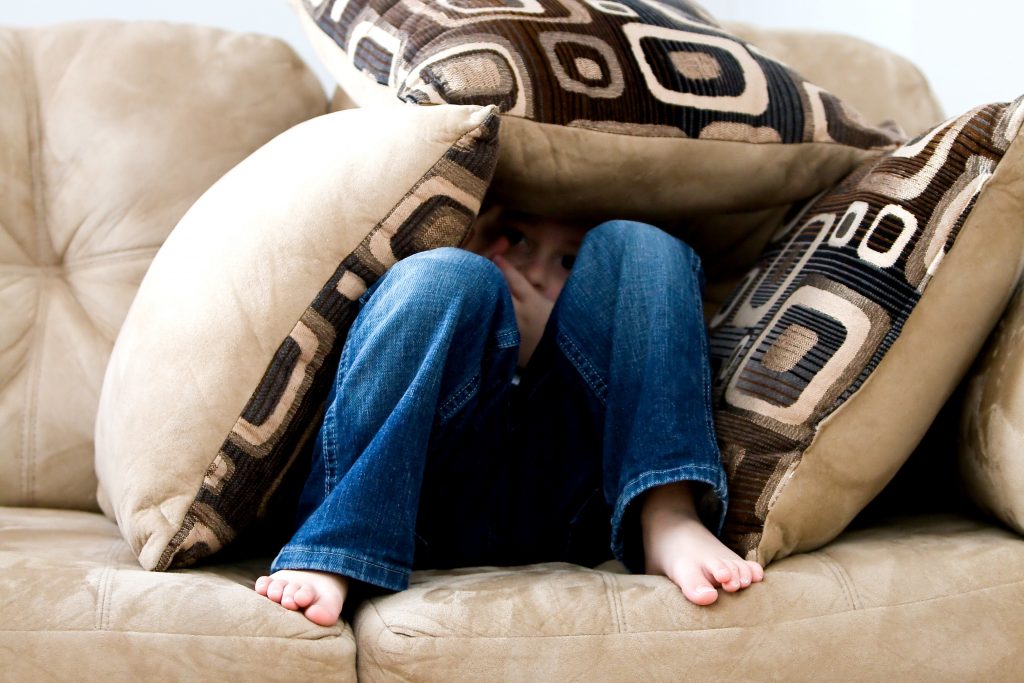Self-Isolation and the Highly Sensitive Person (HSP)

Do you ever find yourself withdrawing or feeling disconnected from friends, family, coworkers or people in general? Do you feel out of place in social settings? Is your alone time starting to feel like self-isolation?
While there is nothing wrong with these tendencies in themselves, for some people, they can be a source of stress or be connected to other problems in their life. Self-isolation is incredibly common amongst highly sensitive people (HSPs) for a number of reasons. If you notice this feature in yourself, it’s important to not shame yourself for it, but rather to become curious about where it might stem from.

Before covering some common reasons for self-isolating, let’s talk about what self-isolation is not. While many people tend to think that how much you socialize with others/withdraw from others is based on features of your personality (such as being a supposed introvert, extrovert or ambivert), this is not always the case.
Self-isolation and withdrawal from others is something experienced by people despite personality type, whether you’ve always been referred to as a social butterfly or as “the quiet one.” Self-isolation is not the same as antisocial behavior but is generally a response to a deeper issue, whether within yourself or with those you generally socialize with.
While there are many triggers for isolation and withdrawal amongst HSPs, I’ll spend some time outlining some of the most common ones I see below and end with some questions to ask yourself if you believe you are experiencing any of these triggers.

FEAR OF BEING MISUNDERSTOOD
As highly sensitive people, we have often experienced a lot of judgment from others in our lives, often regarding the way we do things in our own way. The trauma from this past judgment or continuous judgment from those around us can encourage us to retreat into our shells.
While in some cases it can be a healthy response to want to spend less time with people who may say things that we find triggering or who are judgemental of us, for many people this judgment from others may not actually be real but perceived.
When withdrawal becomes a preventative measure to avoid judgment rather than a direct response to a particular situation, we close ourselves off from opportunities for genuine and fulfilling connections.
FEELING DRAINED FROM SOCIALIZING
We all experience a draining conversation every once in a while. Maybe you had an interview that left you feeling exhausted, or you ran into an old friend who talked so fast to catch you up on everything in their life that it made your head spin, or maybe some forced small talk made you done with socializing for the day.
However, being drained like this every once in a while, whether due to anxiety, particular circumstances, or lack of interest, is different from a chronic drained feeling after human interaction. While a social anxiety disorder or simply an introverted personality is often the diagnosis for this feeling, many HSPs describe being exhausted from socializing due to feeling like they cannot be authentic in their interactions with others.
In connection to the previous trigger, HSPs will often put on a mask when talking to others in order to avoid judgment. There is a sense of irony in this; rather than withdrawing due to a fear of judgment directly, in this case, an extra step is taken to avoid judgment by putting on a mask.
However, doing this is usually so exhausting that those of us who fake our way through conversations ultimately end up having to withdraw in order to recharge anyway.

LACK OF SELF-ESTEEM / IMPOSTER SYNDROME
Have you ever met a cool new person who you would love to hang out with, but felt like they probably wouldn’t want to hang out with you? Or maybe you’ve even had someone like that reach out and ask to chat or get coffee, but you can’t imagine why they would want to do so?
Another reason HSPs describe avoiding socializing is having low self-esteem, or experiencing symptoms of Imposter Syndrome. Imposter Syndrome generally refers to an emotional/psychological pattern where someone doubts themselves and their skills, or feels like a “fraud,” and is afraid of being exposed for “who they really are,” despite the fact that there is no deception or fraud occurring.
On the contrary, people who struggle with Imposter Syndrome are usually highly capable and talented people. While Imposter Syndrome is distinct from having low self-esteem, they share some similar features, especially in cases of socializing, and both can lead to social withdrawal.
Withdrawal rooted in insecurity often shows up as us doubting our abilities to socialize, doubting others’ desire to socialize with us, or even insecurities surrounding our looks or behavior. Similar to a fear of being misunderstood, those of us who struggle with low-self confidence might actually have a fear of being seen/understood for who we are, and people not liking what they see.
In a way, this pattern could be the inverse of the previous trigger I described as well. In this case, you might feel like you’re putting on a mask (when in reality you’re not), rather than the previous example where you are aware of some inauthenticity in your interactions.
LACK OF ENERGY MANAGEMENT / BOUNDARIES, OVERWHELM & BURNOUT
For some of us, socializing and interacting with others seemingly may not take up too much energy, but over time it begins to weigh on us. Eventually, we may start to get to a point where we are feeling so overwhelmed that we need everything to stop, including socializing.
When this happens, it is often a sign of a lack of energy management/boundaries, which leads to overwhelm and burnout, and often, social withdrawal is a first response. The location of this lack of energy management often leads back to one of two places.
One place this usually shows up is that we are overwhelmed by our actual social interactions, which can be because we don’t realize that we might be engaging with people that we find draining. We’re having consistent interactions that aren’t in our best interest or interactions that we aren’t engaging with in a healthy way.
Another place this shows up is that we are overwhelmed, burnt out or lacking boundaries in another area of our lives, whether due to work, mental health, traveling, etc., and our ability and desire to socialize falls away due to this lack of energy management in our lives.
If you are feeling overwhelmed by the thought of socializing, it is important to differentiate whether it is the actual interactions that are disturbing you or if something else in your life is stressing you out to the point that socializing or following through on your commitments get sacrificed.
AVOIDING CONFRONTATION
Have you ever been upset with a friend but felt like you could not approach them on the issue and began avoiding them instead? Or have you ever had an argument with a friend and then avoided that friend after that, even if the argument was resolved?
One other example of why someone might withdraw from interactions with others could be a desire to avoid confrontation. This could be whether you are actively having an issue with another person, or could be a more general fear, where you preemptively avoid close relationships in order to avoid the potential of ever having to confront someone.
Many HSPs have difficulties with confrontation. However, to the dismay of many of us, it is impossible to avoid. Confrontation can be used as an important tool to set boundaries, resolve disagreements, and make things better for yourself and your relationships with others.
As I said earlier, when withdrawal becomes a preventative measure to avoid something specific, we close ourselves off from opportunities for genuine and fulfilling connections.

ACTIONABLE EXERCISES
The above examples are only some of the reasons that people, especially HSPs, tend to isolate themselves from others. As I mentioned earlier, these patterns are not necessarily a problem in themselves, but it is always good to be aware of where your patterns and behaviors stem from.
This is important to examine so that you can make sure that your energy is being utilized towards upholding patterns that are in your best interest rather than ones that might be draining, harmful or keeping you from meeting your goals.
So for example, in the case of self-isolation, you can ask yourself some questions to see if your self-isolation is a symptom of a bigger problem, such as low self-esteem - or if it is a symptom of an improvement you’ve made in yourself, such as setting stronger boundaries to protect your energy.
Here are some other questions to ask yourself in order to evaluate your relationship to self-isolation:
- Why do you isolate yourself?
Focus on cultivating self-awareness around why you withdraw - without assigning a particular value to it first (ex. “isolating myself is good” or, “isolating myself is bad”) - as this is what you will do in the next question.
- Do you feel comfortable self-isolating/withdrawing, or do you find it distressing? Why?
Why do you think you might feel a particular way about your withdrawal? For example, if you feel comfortable with your patterns of withdrawal, is it a healthy, boundaried withdrawal? Or is it because withdrawal might be easier than addressing the root cause of your withdrawal?
If you find it distressing, or how much you withdraw from others bothers you, before you ask how you can address the issue causing you to withdraw - ask yourself why you value interactions with others so highly.
Do they add greatly to your life, or do you just feel like they should? Have you assigned a value to social interaction based on what others have told you? Or do you have a genuine desire to connect with others the way you expect yourself to?
Basically, do you really want to socialize with others, or do you just want to because you feel like you should?
- Would you be comfortable exploring new or different ways to interact with others? What do you need in order to connect consistently and healthily with others?
If in answering the previous questions your answers showed some need for change, what might you be able to explore to help you establish healthier and more fulfilling patterns of interacting with others? Try and think about what is really important to you, experiment, and try not to be limited by labels or things you’ve learned in the past.
For example, perhaps you’ve considered yourself an introvert your whole life as you find some social interaction draining, but you do really feel that you want to engage with others more. Maybe in reality, socializing is not entirely draining for you, but you lack boundaries around the types of people or interactions you engage with.
Instead, see if you can explore what types of socializing “fill you up” rather than drain you; maybe going on a run with a friend really adds to your day, while going clubbing might be a bit much for you.
Or maybe you’re the opposite, contrary to popular belief! Maybe the crowd helps take the focus off of you - rather than just being with one other person, where all the focus is on you. This goes for people who think of themselves as extroverts too, perhaps even more so.
People who are extroverted can just as easily be drained by certain types of social interactions but might tend to guard their energy and the number of social interactions they have less, as they expect themselves to always be fulfilled by socializing.
Try to identify what situations drain you, and put a limit on how long or how often you engage in situations like that or avoid them entirely if you’re able (though this is often not the case for most people).
In addition, ask yourself if you have certain expectations that you (or others have instilled in you) regarding what gets to be considered “socializing.” Any interaction that feels valuable should count; perhaps you aren’t even withdrawing as much as you think, but you have certain judgments around what you “should” be doing!
- What do you find recharging? What changes or forms of self-care/self-awareness can you cultivate in order to socialize in the ways you want to?
Just by seeing what is at the root of your withdrawal, you will not suddenly begin to engage with others constantly!
If you want to engage with these patterns, look at the rest of your life: do you have space to add in more socializing/stop withdrawing, especially if it’s been a pattern of yours for a long time?
Maybe right now, you don’t! These patterns often arise as a protective response, so give that space too. But if it is a priority, how can you prioritize it without overwhelming yourself?
Start small, engage in self-care, and remain aware of the changes you see in your everyday energy and interactions! Really determine what you find recharging so that when you are pushing yourself in these new ways, you don’t push yourself too far.
In conclusion, leave space for yourself to explore why you might be withdrawing without shame, and rather with kindness, understanding, and curiosity about how you can make sure that your patterns align with what you want for yourself.
